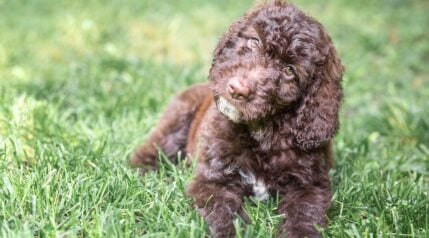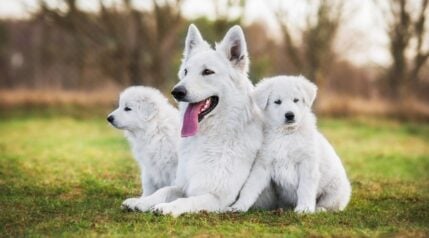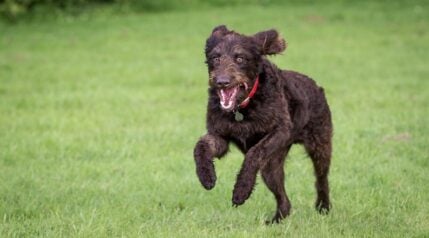Originally Poodles were duck retrievers. A Poodle would jump into the water and swim to the duck he wanted to retrieve. They were bred to be very good swimmers. They are also a popular breed that gets cross-bred with other dogs like the Labrador Retriever or Golden Retriever. The Poodle is a bright, lively, versatile breed that’s currently ranked at number seven on the American Kennel Club’s popularity charts.
These days, Poodles can do many different activities. They are good companions and participate in obedience, agility, flyball, dock diving, conformation, canine freestyle, hunting, and tracking. They also make excellent rescue dogs and service dogs.
Also, the Poodle is a very low shedder, making this breed an excellent choice for a household with allergy sufferers. Did you know that, although the Poodle is generally associated with France, the breed actually comes from Germany? In this article, we take a detailed look at the Poodle’s history, character, and health.
History

Poodles formerly come from Germany. The German name for a Poodle is pudel, which means, “splash in the water.” Many of the most popular names for Poodles are German. That’s a reference to the breed’s primary job as a water retriever. In fact, the fancy show clips that are seen today were once used as a practical way to keep the dog warm when he was working in cold water.
A member of the non-sporting group, the Poodle, comes in three official sizes – the Standard, Miniature, and Toy.
Of the three varieties of the Poodle, the standard is the oldest. The Toy and Miniature Poodle breeds were created by breeding selectively to produce smaller-sized dogs. However, these Poodles were not merely lapdogs! They too had a job to do, sniffing out truffles.
Later in history, Toy and Miniature Poodles became a popular addition to the circus thanks to their supreme intelligence, ability to learn tricks, and love of performing for an enthusiastic audience.
Poodles became especially popular in France where they quickly gained status as companions to the gentry. King Louis XVI loved Toy Poodles, so much that the breed soon became thought of as the official dog of France.
The Poodle is now loved around the world and is one of the most popular breeds of family companion dogs. Of the three sizes of the Poodle, the miniature is most people’s favorite.
Although some Poodles still work as water retrievers, the majority live happily as family pets. Poodles are very successful in performance disciplines, including obedience, agility, flyball, and dock diving. Poodles are intelligent, loyal, and playful. They like to be the center of attention and they enjoy performing tricks.
Temperament

Poodles are well known for being very smart – typically ranked in the top two or three most intelligent breeds! They can be taught just about anything. Despite their elegant attire, they are bred as hunting dogs that thrive on companionship and plenty of active play.
They are friendly and like to be involved with whatever you’re doing. They like other dogs and cats, and they get along well with children.
Like many dogs, Miniature and Toy sizes can be overly excitable if they have nothing to do. This can lead your Poodle to become destructive and loud. All of them enjoy obedience and do well in classes and at dog shows.
Size & Appearance

The Standard Poodle is the biggest of the three Poodle varieties, standing over 15 inches tall and weighing between 40 and 55 pounds. Miniature Poodles are smaller at over ten inches tall but under 15 inches, weighing between 12 and 15 pounds. Toy Poodles are the smallest of the varieties, measuring ten inches or less at the shoulder and weighing between five and ten pounds. Make sure you have the appropriate bed for your Poodle.
Do not be tempted to buy a “teacup” Poodle! These tiny dogs are often sold as rarities, and although they’re super-cute, like all teacup dogs, they are usually unhealthy and have a relatively short lifespan. If you want a more laid-back Poodle, try a mix like the Cavapoo.
No matter the size, Poodles have a square outline, with elongated necks and straight backs. Though their tails are docked, they are still long enough to wave around joyfully. They have long legs and muzzles, along with dropped ears on the sides of their rounded heads.
These handsome and graceful dogs have lots of muscles that make them strong. Because Poodles were born water dogs, they are very good swimmers.
Coat & Colors

One of the most recognizable features of the Poodle is its coat. Their tight, fine, and curly fur does not shed, which makes them great for people suffering from allergies. The fur simply mats in itself, so frequent grooming is required. But more on that later!
Poodles come in many different colors, including:
- Black
- Blue
- Brown
- Apricot
- White
- Silver
- Silver/beige
- Café-au-lait
- Cream
- Red
You can also find “parti-Poodles” which are two-tone, and phantom Poodles that have tan markings similar to those of a Doberman pinscher.
Exercise & Living Conditions

All varieties of Poodles are very active, high-energy dogs that need plenty of exercise every day. At least 90 minutes each day should be enough to keep your Poodle in good shape, physically and mentally.
If you own a Poodle, you’ll need to have lots of time to devote to keeping your canine companion entertained. Poodles love swimming and retrieving, so a trip to the park with a ball or a spot of dock diving is a brilliant way of exercising your dog.
Poodles are highly social dogs that hate solitude. If you put a Poodle in a kennel or force your pet to live outside, your dog will most likely suffer from separation anxiety. Also, a Poodle’s single, fine coat won’t keep him warm enough in freezing weather.
Training

Don’t let the frou-frou haircut fool you! These are highly intelligent, trainable pups who love a challenge and thrive on learning. Poodles can be trained to take part in obedience, flyball, dock diving, and agility events. Keep your training routines fun and consistent, and your Poodle will love it!
It is notable that Poodles are very high jumpers. This can be an excellent skill in agility courses, but you may have to make sure your backyard fence is high enough for your Poodle not to clear!
Health

A healthy Poodle can live for between 10 and 18 years. However, Poodles are prone to a lot of illnesses, some of which are hereditary. In general, Standard Poodles tend to be the healthiest of the three sizes.
So, here are some of the most common health conditions that affect all varieties of Poodles; we recommend pet insurance for your Poodle to help offset costs:
- Addison’s disease
- Cushing’s disease
- Hypothyroidism
- Progressive retinal atrophy (PRA)
- Cataracts
- Glaucoma
- Von Willebrand’s disease
- Bloat
- Sebaceous adenitis
- Hip dysplasia
Cushing’s Disease
Cushing’s disease causes the dog’s adrenal glands to produce an excess of cortisol. Affected animals gain weight, become excessively thirsty and hungry, and suffer from bladder infections. Some previously housetrained dogs begin urinating in the house.
Hypothyroidism
Hypothyroidism is another hormonal problem to which Poodles are prone. The condition occurs when the thyroid gland doesn’t produce enough thyroid hormone for the dog’s needs. The result is hair loss, weight gain, weak disease resistance, increased susceptibility to the cold, and excessive hunger. The condition can usually be managed effectively with lifelong medication.
Progressive Retinal Atrophy (PRA)
Progressive retinal atrophy (PRA) is a genetic eye condition that typically leads to blindness.
Von Willebrand’s Disease
Von Willebrand’s disease is a common genetic bleeding disorder. The condition is caused by a deficiency in the protein that promotes blood clotting. Dogs with Von Willebrand’s disease often experience severe blood loss when they sustain an injury.
Bloat
Standard Poodles can be prone to suffering attacks of bloat. Bloat is more correctly known as gastric dilation volvulus. The condition occurs when the stomach twists, trapping air inside. Bloat is potentially fatal, and emergency surgery is usually required to correct the problem.
Sebaceous Adenitis
Sebaceous adenitis is a skin disease that sometimes affects Standard and Toy Poodles. The condition involves an inflammation of the sebaceous glands in the skin, causing skin problems and hair loss.
Hip Dysplasia
A malformation of the hip joint causes hip dysplasia. The condition is inherited, and its effects can range from minor problems to a life-changing disability. Hip dysplasia can be treated with medication or, in more serious cases, by major surgery.
Other Conditions For Toy Poodles
The following conditions tend to be confined to the smaller Poodle breeds, we recommend looking into pet insurance for your Toy Poodle:
- Luxating patella
- Collapsing trachea
- Dental problems caused by overcrowding
- Legg-Calvé-Perthes disease
Luxating Patella
The patella is the dog’s kneecap. In a healthy joint, the kneecap sits in a groove on the end of the thigh bone, just above the knee. In dogs with luxating patella, the kneecap continually slips out of place, causing intermittent lameness. Luxating patella can be corrected surgically.
Legg-Calvé-Perthes Disease
Legg-Calvé-Perthes disease is also called aseptic or avascular necrosis of the femoral head or ball joint. The condition causes the femoral head to degenerate, leading to collapse of the hip joint and chronic arthritis. The condition often appears in puppyhood and can be treated surgically.
Health Certifications
Bearing in mind the number of potential health issues that can affect Poodles, it’s vital that you ask to see the breeder’s written evidence that they have had their breeding animals screened for the conditions mentioned above.
The National Breed Club recommends the following health tests:
- PRA Optigen DNA test (Toy and Miniature varieties)
- Hip evaluation (Standard and Miniature varieties)
- Patella evaluation (Toy and Miniature varieties)
- Ophthalmologist evaluation (all varieties)
- OFA thyroid clearance testing (Standard variety)
The Poodle Club of America (PCA) participates in the Canine Health Information Center (CHIC) health database. The database contains details of every dog that’s been health tested, so you can check to see if your puppy’s parents are listed here.
Reputable breeders only use breeding dogs that have been screened and cleared for genetic disease, so, in theory, their puppies should be free from hereditary health conditions.
Nutrition

When you pick up your Poodle puppy, it’s a good idea to ask the breeder what brand of food they recommend. Stick to that food for the first six months of your dog’s life, and then switch your pet onto a high-quality adult recipe commercial food.
If you have a Toy Poodle, look for a brand of dry food (kibble) that is specifically made for small dogs. Crunching on kibble helps to rid the dog’s teeth of plaque and bacteria that could lead to gingivitis and periodontal disease. That’s especially important in tiny dogs whose teeth are often overcrowded and very close together.
For more advice on what to feed your Poodle, have a chat with your vet.
Grooming

You’ll need to take your Poodle to the groomer every four to six weeks to have his coat clipped. If you don’t have your Poodle clipped regularly, his coat will quickly become a matted mess, which can cause skin infections to develop. Between clippings, you’ll need to brush your Poodle every other day with a soft-bristled brush to prevent the hair from tangling.
All Poodles need special grooming. They need regular baths and they especially need to be trimmed. Many people take their Poodles to professional groomers. They can make the breed look like a show dog or they can give them a puppy cut, where most of the hair is the same length.
Poodles are also very popular to cross with other breeds because of their fur and the fact that their fur is popular in families that prefer hypoallergenic breeds. Some popular Poodle mixes include the Goldendoodle and Labradoodle, as well as the Bernedoodle which is a Bernese Mountain Dog Poodle mix. Maltipoos are also a popular cross between a Maltese and a Toy Poodle.
Some owners like to leave their Poodle’s coat to grow out into natural cords. However, most people prefer a neat, clipped look for their dog.
Owners of Toy or Miniature Poodles will need to brush their dog’s teeth every day or two with a veterinary toothpaste and toothbrush. This will help prevent bacteria and plaque from forming on the teeth, which could lead to gingivitis (gum disease) and ultimately to periodontal disease.
They are excellent dogs for people who have allergies, most of the time. However, some people are very sensitive and could have a problem even with a dog that is thought to be hypoallergenic. It’s best to check with an allergy doctor before purchasing a new dog.
Breeders & Puppy Costs

The best place to begin your quest to find the perfect Poodle puppy is the Poodle Club of America’s website. Another good place to search for Poodle breeders is on the American Kennel Club’s website.
Responsible breeders must abide by the PCA’s strict, ethical guidelines that forbid the sale of puppies through auctions, brokers, or commercial dealers such as pet shops. You should also look for a breeder who will give you a written contract that promises to take the dog back at any time during his life if you find yourself unable to keep your pet.
Good breeders will have their puppies’ parents’ health screened and cleared of all the severe congenital conditions the Poodle breed can be susceptible to. So, how can you know a good breeder from a dodgy one?
Here are a few warning signs you should be aware of, especially when looking at online advertisements:
- Breeders who have multiple litters for sale
- Breeders with a seemingly unlimited supply of puppies for sale
- Breeders who give you the option to pay for your puppy online with a credit card
- Breeders who offer very cheap puppies “without papers”
Another common scam to watch out for is a website that offers to ship the puppy to you. Most buyers end up with no puppy at all or with one that’s not as advertised. You must always visit the breeder’s kennels to see the puppy and his parents in the flesh before you part with any cash.
The cost of a Poodle puppy varies tremendously, depending on where you live, the puppy’s sex, and what kind of show record the pup’s parents have. A well-bred puppy from a reputable breeder would cost you from around $1,000 to $5,000.
If you’re offered a cheap puppy, he may come from a puppy mill. Never buy a puppy from a puppy mill or farm. Puppy mills are set up purely to produce as many puppies as quickly and cheaply as possible.
The breeding stock used in mills is often not health-screened for congenital diseases and conditions that their offspring could inherit. Also, a puppy from a mill will most likely not be vaccinated, wormed, or treated for fleas. Consequently, you could finish up with a sickly puppy that comes with a whole host of potentially serious health problems. Note here that many small pet shops source their puppies from puppy mills.
There are also many different mixed-breed Poodle pups. Designer Dogs have become more and more popular over the last couple of decades, and some of them are the Toy version while others are from the standard line of Poodle. Let’s look at some of our favorite Poodle mixes.
Rescues & Shelters

If you don’t want a puppy and would prefer to take on an adult dog, you could rehome a Poodle from a rescue shelter. Check out this link to the Poodle Club of America’s Rescue Foundation to see what rescued Poodles are currently up for adoption.
Although adopting a Poodle from a shelter will give you a warm, fuzzy feeling of doing a good deed, you should proceed with caution. Not every dog from a shelter comes with a history so you could be taking on a whole lot of problems.
If possible, make arrangements with the shelter to take the Poodle on a trial basis for a few weeks to see if he settles into your home. After the trial, you can opt to keep the dog or return him to the shelter if the Poodle proves to be unsuitable for any reason.
As Family Pets
So, armed with all the information we’ve provided for you, would a Poodle make the perfect pet for your household?
- Poodles get on well with kids, other dogs, and cats. However, early socialization is essential.
- Poodles are highly intelligent and quick to learn. You can have hours of fun training your Poodle to take part in canine sports if you want to or perhaps just spend time teaching your dog some entertaining party tricks.
- Miniature Poodles like to follow their human family around and are the best choice if you have small children in your household.
- If you’re looking for an amusing lapdog with a sense of humor, a Toy Poodle will make a good choice for you.
- If you buy a Standard Poodle, you’ll need plenty of space to accommodate him, including a backyard.
- Toy and Miniature Poodles will be a good choice if you live in an apartment or a small house.
- The Poodle’s fine curly coat sheds very little, making the breed a good choice for those with pet hair allergies.
- Although Poodles don’t need too much grooming, you will need to have your dog clipped regularly by a professional groomer to prevent the coat from becoming tangled and matted.
- All varieties of Poodles are energetic and lively dogs that need plenty of exercise.
- Exercise requirements multiply if you have a mixed breed that’s more active like the Siberpoo.
- Poodles are high energy, making training them with a Poodle-appropriate dog crate, a very good idea.
So, a Poodle would be the ideal pet for an active family in a household with kids and other dogs. Be sure to spend the time you’ll save on grooming in exercising and training your Poodle; he’ll love you for it.
Final Thoughts
If you want a lively, intelligent, fun dog to have around who’ll get on well with all your family members and other pets, a Poodle could be the answer.
Those with plenty of space may want to take on a Standard Poodle, while would-be owners with limited space can still enjoy the Poodle’s many appealing traits by offering a home to a Toy or Miniature Poodle.
Poodles are great for those who have a pet hair allergy, as the breed’s curly coat sheds minimally. Having your Poodle clipped every six weeks or so will also help to minimize shedding and keep your dog’s coat from matting.





